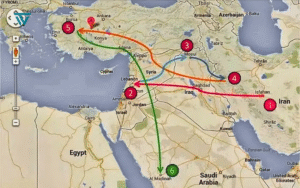Hazrat Ali ibn Abu Talib (RA) the fourth Caliph of Islam

Among the personalities in the history of Islam who are forever remembered for their extraordinary contributions, wisdom, bravery, and sacrifice, Hazrat Ali Ibn Abu Talib (R.A.) is a shining star. He was the fourth Caliph of the Muslim world, the beloved paternal cousin of the Great Prophet Hazrat Muhammad (PBUH), his affectionate son-in-law, and a prominent member of his sacred Ahl al-Bayt (Household). His life was dedicated to the service of Islam and humanity. A rare combination of knowledge, bravery, justice, sacrifice, and spirituality was present in his character.
The Prophet Muhammad (PBUH) and the Muslim community honored him with powerful titles such as Asadullah (The Lion of Allah) for his unparalleled bravery in battle, and Amirul Mu’minin (Commander of the Faithful) as the rightful leader of the Muslim Ummah, reflecting his unmatched courage, wisdom, and leadership. He is also one of the ten companions who were given the glad tidings of Paradise by the Messenger of Allah (PBUH). The life and work of Hazrat Ali (R.A.) have been an unending source of inspiration for the Muslim Ummah through the ages.
Name, Lineage and Birth of Hazrat Ali Ibn Abu Talib (RA)
Hazrat Ali Ibn Abu Talib (RA), the Fourth Caliph of Islam, was born into the noble Qurayshi community, specifically the esteemed Banu Hashim family of Makkah. His full name was Ali Ibn Abu Talib, and his renowned titles or Kunyas included Abul Hasan and Abu Turab (Father of Dust), the latter given affectionately by the Messenger of Allah (PBUH) during a moment of endearment. Har father, Abu Talib Ibn Abdul Muttalib, was not only the chief of the Banu Hashim but also the beloved paternal uncle and protector of Prophet Muhammad (PBUH). His mother, Fatimah Bint Asad Ibn Hashim, was a devout woman from the same revered Hashimi lineage. Both parents being Hashimis gave Hazrat Ali (R.A.) a deeply respected ancestral background among the people of Makkah.
Historical sources present slight differences in his date of birth—some cite October 23, 598 CE, others March 17, 599 CE or March 17, 600 CE. However, the most commonly accepted opinion is that he was born approximately ten years before the Prophet (PBUH) received his first divine revelation, making Hazrat Ali one of the earliest and youngest to be nurtured under the Prophet’s direct care and spiritual guidance.
A Miraculous Birth Inside the Holy Kaaba
A truly miraculous and honorable event surrounds his birth: Hazrat Ali (R.A.) was born inside the Holy Kaaba. According to multiple authentic narrations, when his mother Fatimah Bint Asad felt labor pains near the Kaaba, she clung to its wall and prayed for ease. At that divine moment, the wall of the Kaaba split open by the command of Allah, allowing her to enter. There, within the sacred sanctuary, she gave birth. After three days inside, she emerged with her newborn child in her arms. The Prophet Muhammad (PBUH), who was waiting outside, lovingly took the infant into his blessed arms and performed the tahneek (placing blessed saliva in the baby’s mouth). He then named him Ali, meaning “elevated,” “exalted,” or “noble.”
This extraordinary event is a unique honor, making Hazrat Ali (R.A.) the only person known to be born inside the Holy Kaaba — a distinction that further signifies his divine favor and spiritual rank from the moment of his birth.
Childhood and the Companionship of the Messenger (PBUH)
From early childhood, Hazrat Ali ibn Abu Talib (RA) enjoyed the rare blessing of being raised by the Messenger of Allah (PBUH) himself. During a time of economic hardship in Mecca, the Prophet (PBUH) took the five-year-old Ali into his home to ease the burden on his uncle, Abu Talib. In the loving care of the Prophet (PBUH) and Hazrat Khadija (RA), Ali grew up in an atmosphere filled with compassion, discipline, and spiritual light.
Even before the first revelation, he absorbed the values of truth, justice, and faith. He often accompanied the Prophet (PBUH) to the Cave of Hira, observing his meditative solitude and gaining deep spiritual insight. This close relationship shaped Ali’s character and prepared him for his future role as a courageous leader and devoted servant of Islam.
His unwavering loyalty and early companionship with the Prophet (PBUH) laid the foundation for a life of sacrifice and service. This journey ultimately led him to become the Fourth Caliph of Islam, a title that reflects his immense contribution to the faith. As he beautifully expressed in Nahj al-Balagha, “I followed the Prophet just as a camel’s calf follows its mother,” highlighting his deep attachment and faithful dedication.
Acceptance of Islam – A Pivotal Step by the Fourth Caliph of Islam
Early Embrace of Faith by Hazrat Ali ibn Abu Talib (RA)
When the Messenger of Allah (PBUH) received the first revelation, Hazrat Ali ibn Abu Talib (RA) was only about 9 to 11 years old. Despite his young age, he was among the first to embrace Islam. According to most historians, he was the first boy—and by some accounts, the first male—to accept the Prophet’s (PBUH) divine message.
After Hazrat Khadija (RA), he stood as one of the earliest and most loyal supporters of Islam. When the Prophet (PBUH), under Allah’s command, invited his close relatives to accept the truth during the “Yawm al-Inzar” (Day of Warning), none responded at first. But young Ali (RA) courageously stood up and pledged his unwavering support.
From childhood, Hazrat Ali ibn Abu Talib (RA) showed no interest in idol worship. His heart remained pure, making his entry into Islam a natural alignment with divine truth—rather than a conversion in the conventional sense. His early faith and fearless commitment marked the beginning of a life devoted entirely to the service of Islam.
Meccan Life and Sacrifice for Islam: Hazrat Ali ibn Abu Talib (RA)’s Courageous Journey
In the early days of Islam, Hazrat Ali ibn Abu Talib (RA) stood firmly beside the Messenger of Allah (PBUH) despite severe persecution from the Meccan polytheists. Hazrat Ali ibn Abu Talib (RA) protected the Prophet with fearless dedication. During the Prophet’s preaching in Taif, when cruel boys threw stones, Hazrat Ali ibn Abu Talib (RA) shielded him without hesitation.
One of the most dangerous moments came on Laylat al-Mabit, the night of the Hijra. The enemies planned to kill the Messenger (PBUH) and surrounded his house. Hazrat Ali ibn Abu Talib (RA) bravely lay on the Prophet’s bed, covered with his sheet, risking his life to save him. This act of sacrifice allowed the Prophet to escape safely.
The next morning, the enemies found Hazrat Ali ibn Abu Talib (RA) in the Prophet’s place. He then returned all trusts left with the Messenger (PBUH) to their owners. A few days later, Hazrat Ali ibn Abu Talib (RA) migrated to Medina with his mother Fatimah Bint Asad, the Prophet’s daughter Hazrat Fatimah (RA), and other women. At this time, Hazrat Ali ibn Abu Talib (RA) was about 22 or 23 years old. When disbelievers tried to stop them, he defended their path bravely.
Later, Hazrat Ali ibn Abu Talib (RA) became the Fourth Caliph of Islam, continuing to serve the Muslim community with justice and wisdom.
Medinan Life: Hazrat Ali ibn Abu Talib (RA)
After migrating to Medina, the Messenger of Allah (PBUH) established a sacred bond of brotherhood between the Muhajirin (migrants) and the Ansar (helpers). As part of this, he accepted Hazrat Ali ibn Abu Talib (RA) as his own brother, demonstrating their deep relationship and highlighting Ali’s special status with the Prophet (PBUH).
In the second year of Hijra, following the Battle of Badr, the Messenger (PBUH) solemnized the marriage of his beloved daughter Hazrat Fatimah Zahra (RA) to Hazrat Ali ibn Abu Talib (RA). This simple yet ideal ceremony became a shining example in Islamic history. At that time, Ali (RA) was around 21 to 23 years old, while Hazrat Fatimah (RA) was between 14 and 18 years old. Their marriage was marked by love, sacrifice, and mutual respect.
Their household was blessed with children who became bright stars in Islamic history: Imam Hasan (RA), Imam Husayn (RA), Hazrat Zaynab (RA), and Hazrat Umm Kulthum (RA). Some narrations also mention another son, Muhsin, who passed away in infancy.
Military Life and Major Battles of Hazrat Ali ibn Abu Talib (RA)
Hazrat Ali ibn Abu Talib (RA) was a legendary warrior whose bravery struck fear into his enemies. Except for the Battle of Tabuk, he fought in nearly all battles during the Messenger of Allah’s (PBUH) lifetime. The Prophet (PBUH) often entrusted him with carrying the Muslim army’s flag.
Battle of Badr (2 AH)
In the first major battle of Islam, Hazrat Ali (RA) showed great courage. He defeated Walid Ibn Utbah, a prominent Quraysh hero, in a duel. Many enemy leaders fell by his sword.
Battle of Uhud (3 AH)
When the Muslim army faced setbacks, Hazrat Ali (RA) protected the Messenger of Allah (PBUH). He and a few companions formed a defensive line around the Prophet. Hazrat Ali (RA) suffered sixteen serious injuries during this battle.
Battle of Khandaq (Battle of the Trench, 5 AH)
Conquering Khaybar’s forts was difficult. The Messenger (PBUH) said he would give the war flag to a man loved by Allah and His Messenger. The next day, he gave the flag to Hazrat Ali (RA). Although Ali had an eye ailment, the Prophet (PBUH) cured him by applying his saliva. Hazrat Ali (RA) then fought bravely and captured the fort of Qamus. He killed the Jewish hero Marhab in a duel. According to reports, he uprooted a massive gate and used it as a shield. The Messenger (PBUH) named him ‘Asadullah’ (Lion of Allah) and gave him his famous sword, Zulfiqar.
Other Campaigns and Roles
Hazrat Ali (RA) carried the flag during the conquest of Mecca (8 AH). He helped remove 360 idols from the Kaaba. He also fought in the battles of Hunayn and Taif. In 10 AH (631-32 CE), the Prophet (PBUH) sent him to Yemen. There, he preached Islam and collected Zakat. Many individuals, including the Hamdan community, accepted Islam because of his efforts. After the ninth Surah (Al-Bara’ah or At-Tawbah) was revealed, the Messenger (PBUH) assigned Hazrat Ali (RA) to proclaim its first thirteen verses publicly in Mina during Hajj.
Knowledge and Wisdom of Hazrat Ali ibn Abu Talib (RA)
Hazrat Ali ibn Abu Talib (RA) was a vast ocean of knowledge. The Messenger of Allah (PBUH) said about him, “أنا مدينة العلم وعلي بابها” — “I am the city of knowledge, and Ali is its gate.” This Hadith shows the depth of his unmatched knowledge.
He was one of the greatest Huffaz (memorizers) and Mufassirin (exegetes) of the Quran. He was also a narrator of Hadith, an expert in Islamic law and jurisprudence, and a shining star in Arabic language and literature.
It is believed that Hazrat Ali (RA) was the first person to compile the rules of Arabic grammar, known as Ilm al-Nahw.
His insightful sermons, letters, and wise sayings are collected in the book Nahj al-Balagha (The Peak of Eloquence). This work remains a priceless treasure of Arabic literature and a rich source of spiritual and moral guidance.
Life Before Caliphate
During the caliphates of Hazrat Abu Bakr (RA), Hazrat Omar (RA), and Hazrat Usman (RA), after the passing of the Messenger of Allah (PBUH), Hazrat Ali (RA) played a vital role as a wise advisor. He was a deep scholar of Sharia and a just judge.
Though some narrations mention a slight delay of about six months in his pledge (Bay’at) to the first Caliph Hazrat Abu Bakr (RA), Hazrat Ali (RA) consistently worked for the unity and welfare of Islam.
He was also one of the six members of the electoral council appointed by Hazrat Omar (RA) on his deathbed. This council elected Hazrat Usman (RA) as the third Caliph.
Throughout the reigns of these three Caliphs, Hazrat Ali (RA) provided valuable advice on religious, judicial, and political matters.
Election of Caliph
In 35 AH (656 CE), the third Caliph, Hazrat Usman (R.A.), was brutally martyred by rebels. This event threw the Muslim Ummah into crisis and chaos. For five days, Medina was in a state of anarchy.
Prominent companions and ordinary Muslims came together and asked Hazrat Ali (R.A.) to take on the great responsibility of the Caliphate. Some narrations mention Abdullah Ibn Saba, the leader of Egyptian rebels (though historically disputed), who supported Hazrat Ali (R.A.)’s Caliphate, claiming the Messenger (PBUH) had bequeathed it to him.
At first, Hazrat Ali (R.A.) hesitated to accept this role. However, due to widespread public pressure and the urgent need for unity and peace, he finally accepted the Caliphate on June 23, 656 CE — six days after Hazrat Usman (R.A.)’s martyrdom. The people gave him their Bay’at (oath of allegiance).
Principles of Governance and Challenges
Upon assuming the Caliphate, Hazrat Ali (R.A.) moved the capital from Medina to Kufa in Iraq. Kufa was more centrally located within the Islamic empire at the time.
He based his governance on strict adherence to the Quran and Sunnah. He emphasized justice, fair distribution of wealth from the Bayt al-Mal (public treasury), and merit-based appointments.
Despite this, Hazrat Ali (R.A.) faced many challenges. The demand to punish the killers of Hazrat Usman (R.A.) grew intense. Influential companions such as Hazrat Talha (R.A.) and Hazrat Zubayr (R.A.) pushed for swift action.
Hazrat Ali (R.A.) believed in restoring peace and order first, then prosecuting the killers. This difference in opinion eventually led to the first Islamic civil war, known as the Fitna.
Battle of Jamal (Battle of the Camel, 36 AH)
To demand justice for Hazrat Usman (R.A.), a group led by the Messenger’s wife, Hazrat Aisha (R.A.), along with Hazrat Talha (R.A.) and Hazrat Zubayr (R.A.), marched from Mecca toward Basra.
Hazrat Ali (R.A.) tried hard to avoid bloodshed but failed. A battle took place near Basra, called the Battle of Jamal because Hazrat Aisha (R.A.) was present on a camel during the fight.
Before the battle, Hazrat Talha (R.A.) and Hazrat Zubayr (R.A.) left the battlefield but were killed by assassins on the way. Hazrat Ali (R.A.)’s forces won the battle.
He respected Hazrat Aisha (R.A.) and sent her safely back to Medina under the care of her brother, Muhammad bin Abu Bakr (R.A.). Later, Hazrat Aisha (R.A.) regretted her participation in the battle.
Battle of Siffin and Arbitration (37 AH)
Hazrat Muawiyah (R.A.), governor of Syria and relative of Hazrat Usman (R.A.), refused to pledge allegiance to Hazrat Ali (R.A.). He demanded revenge for Hazrat Usman (R.A.)’s death.
Hazrat Ali (R.A.) invited Muawiyah (R.A.) to unite for Islam’s greater good, but Muawiyah refused. This forced Hazrat Ali (R.A.) to march against him.
A long and bloody battle followed at Siffin on the Euphrates River bank in July 657 CE. When Hazrat Ali (R.A.) was close to victory, Muawiyah’s forces tied copies of the Quran to their spears, proposing a ceasefire and arbitration.
To avoid more bloodshed, Hazrat Ali (R.A.) reluctantly agreed. Abu Musa al-Ash’ari (R.A.) acted as his arbitrator, while Amr ibn al-As (R.A.) represented Muawiyah (R.A.).
Sadly, due to Amr ibn al-As’s stratagem, the arbitration failed and harmed Hazrat Ali (R.A.)’s political position. This deepened divisions in the Muslim community.
Rise of the Kharijites and Battle of Nahrawan (38 AH)
The decision to accept arbitration caused a faction in Hazrat Ali (R.A.)’s army to rebel. They claimed, “La Hukma Illa Lillah” — “Judgment belongs to none but Allah.” This group became known as the Kharijites (seceders).
They labeled Hazrat Ali (R.A.), Hazrat Muawiyah (R.A.), and Amr ibn al-As (R.A.) as disbelievers. Hazrat Ali (R.A.) first tried to reason with them but failed.
He was forced to fight them at Nahrawan. Many Kharijites were killed, but the group grew more violent afterward.
Martyrdom of Hazrat Ali Ibn Abu Talib (RA)
The Kharijites planned to assassinate Hazrat Ali (R.A.), Hazrat Muawiyah (R.A.), and Amr ibn al-As (R.A.) on the same day as revenge.
On the 19th of Ramadan, 40 AH (some narrations say 17th or 21st Ramadan), which corresponds to January 27, 661 CE, Hazrat Ali (R.A.) was attacked. While going for Fajr prayer at the mosque in Kufa—or according to some accounts, while in prostration during prayer—a Kharijite named Abd al-Rahman Ibn Muljam struck him with a poisoned sword. The blow was fatal.
Hazrat Ali (R.A.) was severely wounded and passed away as a martyr two days later, on the 21st of Ramadan (January 29, 661 CE), at the age of 63.
Before dying, he instructed his son Imam Hasan (R.A.) not to retaliate excessively against Ibn Muljam. If Hazrat Ali (R.A.) survived, he said, the attacker should be forgiven; if he died, only a proportional retaliatory punishment (Qisas) should be carried out.
Imam Hasan (R.A.) led the funeral prayer. Hazrat Ali (R.A.) was buried near the mosque in Kufa, which is present-day Najaf city in Iraq.
With his martyrdom, the Golden Age of the Rightly Guided Caliphs (Khulafa Rashidun) came to an end in Islamic history.
Character and Qualities of Hazrat Ali Ibn Abu Talib (RA)
Hazrat Ali (R.A.) had a character of unmatched beauty and strength. Some of his most notable qualities include:
- Immensely Brave and Valiant Warrior: Known as “Asadullah” (the Lion of Allah), his courage was legendary.
- Supremely Just: As Caliph, he was strict and fair, never hesitating to rule justly even against his own family.
- Deeply Knowledgeable and Wise: Called “the gate of the city of knowledge,” he provided solutions to the most complex issues.
- Extremely Humble and Simple: Despite his position, he lived modestly, worked with his own hands, and mended his worn clothes.
- Uniquely Generous and Liberal: He never turned away anyone in need, often feeding others even when hungry himself.
- Patient and Tolerant: He maintained patience during hardships and showed mercy even to his enemies.
- God-Fearing and Devoted in Worship: Known for his deep night prayers and heartfelt supplications, he was detached from worldly desires.
- Eloquent Literary Figure and Speaker: His speeches and writings remain priceless treasures of Arabic literature.
Historian P.K. Hitti said:
“Ali (R.A.) was brave in battle, wise in counsel, clear and fluent in speech, loyal to friends and merciful to enemies.”
Historian Masudi stated:
“The qualities with which Allah adorned him, we shall not find in anyone before or after him (except the Messenger Karim PBUH).”
Hazrat Ali Ibn Abu Talib (RA) in the Holy Quran
Many scholars believe that several verses in the Holy Quran refer to Hazrat Ali (R.A.) or events involving him. Hazrat Abdullah Ibn Abbas (R.A.) narrated that no other companion had their qualities mentioned as often in the Quran as Hazrat Ali (R.A.).
Below are a few notable examples:
“وَمِنَ النَّاسِ مَنْ يَشْرِي نَفْسَهُ ابْتِغَاءَ مَرْضَاتِ اللَّهِ وَاللَّهُ رَءُوفٌ بِالْعِبَادِ”
“And among the people is he who sells himself, seeking the approval of Allah. And Allah is Kind to His servants.”
(Surah Al-Baqarah, Verse 207)
According to many Mufassirin (Quran commentators), this verse refers to Hazrat Ali (R.A.). He risked his life by sleeping in the bed of the Prophet Muhammad (PBUH) during the night of the Hijra, allowing the Prophet to escape safely from Makkah.
“قُلْ لَا أَسْأَلُكُمْ عَلَيْهِ أَجْرًا إِلَّا الْمَوَدَّةَ فِي الْقُرْبَىٰ”
“Say [O Muhammad], ‘I ask not of you for it any reward except love for [my] near relatives.’”
(Surah Ash-Shura, Verse 23)
According to many narrations, the term ‘Qurba’ (near relatives) includes the Ahl al-Bayt: Hazrat Ali, Fatimah, Hasan, and Husayn (R.A.). This verse highlights the importance of loving the Prophet’s close family.
“إِنَّمَا وَلِيُّكُمُ اللَّهُ وَرَسُولُهُ وَالَّذِينَ آمَنُوا الَّذِينَ يُقِيمُونَ الصَّلَاةَ وَيُؤْتُونَ الزَّكَاةَ وَهُمْ رَاكِعُونَ”
“Your ally is none but Allah and [therefore] His Messenger and those who have believed—those who establish prayer and give zakah while they are bowing.”
(Surah Al-Ma’idah, Verse 55)
Many scholars state that this verse was revealed in praise of Hazrat Ali (R.A.). He gave his ring to a beggar during prayer while in the position of bowing (Ruku’), showing his generosity and devotion.
Contribution and Significance in Islam
Hazrat Ali (R.A.) made unforgettable contributions to Islamic history:
- He constantly supported and risked his life protecting the Messenger (PBUH) during Islam’s early days.
- He showed unmatched bravery in every major battle, from Badr to Khaybar, strengthening Islam’s foundation and victories.
- He preserved, explained, and passed down deep knowledge of the Quran and Hadith to later generations.
- He developed the Islamic judicial system, upheld justice, and solved complex Sharia issues.
- He compiled Arabic grammar rules, which helped non-Arabs learn the Quran and Islamic teachings more easily.
- He set an exemplary standard for future Muslim rulers through his just rule and simple lifestyle.
- His wise counsel, sermons, and letters (collected in Nahj al-Balagha) have guided morality, spirituality, and the straight path for centuries.
- He was among the ten companions promised Paradise by the Messenger (PBUH) (Al-Ashara al-Mubashshara).
Conclusion
Hazrat Ali Ibn Abi Talib (R.A.) was a rare and timeless figure in Islamic history. His life embodied faith, knowledge, bravery, justice, sacrifice, wisdom, and deep love for the Messenger. He remains a shining role model for the Muslim Ummah. By learning from his example, we can improve both our personal and social lives and strive to build a just and fair society. He holds a permanent place of respect and love in the hearts of Muslims worldwide. His legacy will continue to guide us like a shining beacon.






